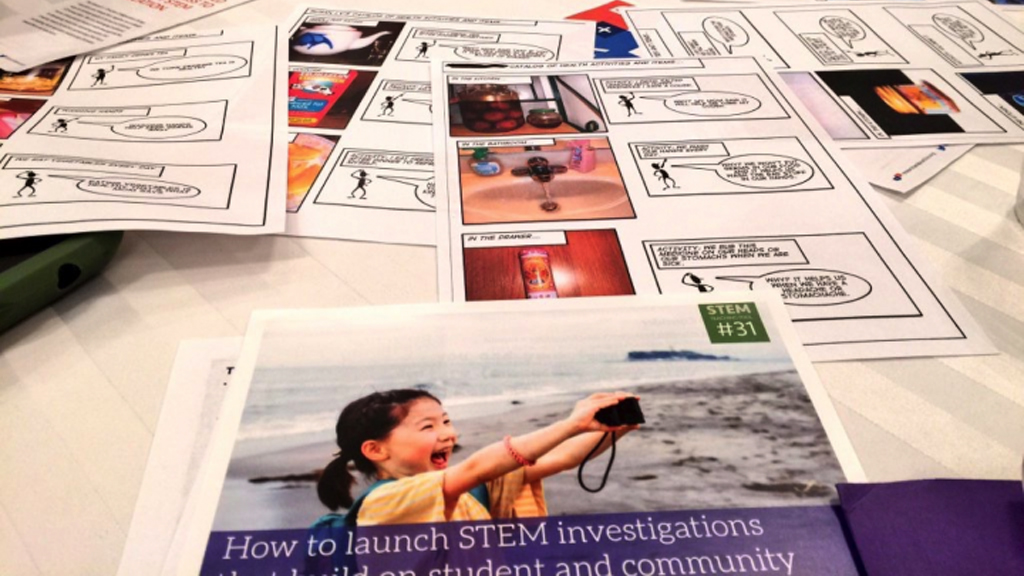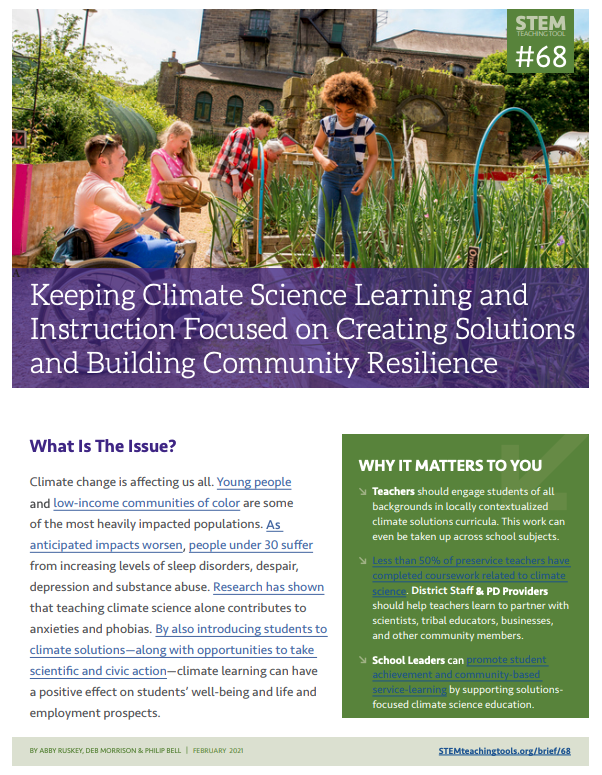Brief
STEM Teaching Tools: Guidance for Justice-Centered Climate Change Teaching and Learning
Connected Science Learning September-October 2021 (Volume 3, Issue 5)
By Philip Bell and Abby Rhinehart

It can be complicated to facilitate justice-centered climate change learning in the PK–12 classroom and in community-based learning settings. While there are challenges, this form of interdisciplinary learning provides many crucial and compelling opportunities for place-based, action-oriented learning focused on societally relevant phenomena—matters of consequence for youth, communities, and all living things.
The Institute for Science + Math Education in the College of Education at the University of Washington has been expanding its free STEM Teaching Tool collection to more coherently address the challenges and opportunities found in justice-centered climate change education. This resource collection supports equitable science instruction (Bell 2019) with emphasis on how we build our capacity to disrupt climate change through bold, ethical, community-grounded responses. We provide the resources for broad use and adaptation as Open Education Resources (OER) that share research- and practice-based knowledge through a Creative Commons licensing. STEM Teaching Tools is a non-commercial, academic enterprise funded through public sources.
STEM Teaching Tools: Practical Tools for Science Educators
Since 2014 we have engaged teams of educators, educational leaders, community organization representatives, educational researchers, and natural scientists to collaboratively create tools for educators to help them productively engage with specific problems and opportunities of educational practice. To support educators in the ongoing process of making science learning experiences more inclusive and culturally significant, each STEM Teaching Tool two-page practice brief highlights a particular dimension of equitable instruction in science education by summarizing an issue, recommending actions, and providing hyperlinked background resources and pedagogical tools.
These practice briefs help support implementation of the National Research Council’s A Framework for K–12 Science Education (NRC 2012) in ways that keep front and center the needs of students farthest from educational justice. We hope any educator will find tools that meet their needs, including ideas and strategies they can use in their classroom. To learn more about this effort, you can read about why we launched it and what we hope to accomplish.

Justice-Centered Climate Change Teaching and Learning Tools
As we learn more through our partnerships, we’ve been working with a network of collaborators to create tools specifically focused on justice-centered, asset-based environmental and climate change instruction. These tools link the work done in a broad variety of science learning contexts. For example, some tools help school-based educators consider how to collaborate with communities around curriculum design, while others bring learning from Indigenous nations into conversation with U.S. school and community contexts to help teachers create activities that engage multiple ways of knowing. Some examples of environmental, climate, and justice-focused tools include:
Why Teach Climate Change?
- Scientific literacy involves understanding global climate change & what people can do about it
- Addressing controversial science topics in the K–12 classroom
- Navigating the political dimensions of climate change teaching and learning
Pedagogy With a Foundation of Justice and Ecological Caring
- How can environmental educators practice intersectional environmentalism?
- Getting their hands dirty: Engaging learners in authentic science practices outside the classroom
- Using science investigations to develop caring practices for social-ecological systems
- Why it is crucial to make cultural diversity visible in STEM education?
- Implementing meaningful STEM education with Indigenous students & families
- How can you advance equity and justice through science teaching?
Selecting Justice-Centered, Local Anchor Phenomena
- Using local phenomena to communicate climate solutions
- Focusing science and engineering learning on justice-centered phenomena across PK–12
Focusing Climate Change Learning on Solutions
Building Partnerships With Scientists, Families, and Other Community Members
- Designing and participating in community and citizen science efforts to support equity and justice
- Connecting science instruction to neighborhood life through collaborative design with community
- Building family-centered models for science education through learning in places
The STEM Teaching Tools collection, while initially designed for K–12 teachers, is already being used to support learning for educational leaders, community-based educators, scientists engaged in outreach, and others working on climate learning efforts. We will continue to evolve the growing collection’s content so it can be leveraged for different purposes by people in different roles, all working for justice-centered climate learning.

Related Resources for Professional Learning Around Climate and Environmental Justice in Education
In winter 2021, Philip Bell and colleague Nancy Price taught a graduate seminar on Climate and Environmental Justice in Education at the University of Washington. As part of this course, they mixed open educational academic resources with STEM Teaching Tools and other practice-focused resources to support deep explorations of justice-centered ideas, contexts, and responses. The course is openly available here:
- Climate and Environmental Justice in Education Graduate Seminar (with readings, slides, assignments, resources)
- Journal of Course Activities on Twitter
- Course-Related Resources and Related Ideas Shared on Twitter
The unfolding effects of global climate change are rapidly increasing—as witnessed through recent mega-fires, widespread drought conditions, new degrees of flooding, widespread animal die-offs, failing infrastructure, and other cataclysmic events. As these multifaceted, uneven, and deepening impacts of our shifting climate continue, we urgently need to continue to build capacity to address emerging issues and foster justice-focused learning and coordinated collective action broadly, across all contexts and for all ages. We believe OER materials provide a crucial societal infrastructure for ethically and effectively addressing climate change and promoting more just, thriving futures for the living world.
Acknowledgments
We are grateful to our many collaborators that helped develop these resources and our users that continue to inform and inspire our efforts. These resources have been developed with support by the National Science Foundation under Grant Nos. 1920249, 1238253, and 1854059; and the Washington State Office of Superintendent of Public Instruction (OSPI) through the ClimeTime initiative. Any opinions, findings, and conclusions or recommendations expressed in this material are those of the authors and do not necessarily reflect the views of any funder.
Philip Bell is Professor of Education and holds the Shauna C. Larson Chair in Learning Sciences at the University of Washington. His current research focuses on understanding and resourcing equity improvements in PK–12 science education—with a key focus on promoting climate and environmental justice across scales of educational implementation. Abby Rhinehart (rhinehah@uw.edu) is a research scientist at the University of Washington, Institute for Science and Math Education, where she manages both communications and research projects. She has worked as an out-of-school educator in several locations, including the Washington State History Museum and Mt. Rainier.
citation: Bell, P., and A. Rhinehart. 2021. STEM teaching tools: Guidance for justice-centered climate change teaching and learning. Connected Science Learning 3 (5). https://www.nsta.org/connected-science-learning/connected-science-learning-september-october-2021/stem-teaching-tools
Climate Change Equity Interdisciplinary Professional Learning old STEM Teaching Strategies Informal Education


